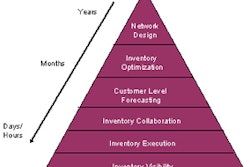Boston — February 9, 2007 — Looking to outsource some or all of your indirect procurement? Not so fast, advises NelsonHall, a business process outsourcing (BPO) analyst firm.
Procurement BPO can yield significant benefits when done properly, says Rachael Stormonth, research director at NelsonHall and author of a new report called "Indirect Negotiations: Factors to Consider."
But Stormonth says that organizations considering outsourcing areas of their indirect procurement should be very clear as to the internal issues that have contributed to this decision before forging ahead with a BPO project.
"Immature" Market
"Identifying these internal issues will both help an assessment of whether these can be addressed through BPO and also the identification of service providers with appropriate capabilities," Stormonth says. She adds, "Outsourcing can be particularly problematic for large decentralized multi-national organizations, or any organization where buying is highly fragmented."
The NelsonHall report, targeted at buy-side organizations that are considering BPO for any of their indirect procurement, provides insights into factors and aspects to consider when entering into detailed discussions with potential service providers. A separate market study assesses global indirect procurement business issues and attitudes towards how these issues need to be addressed.
"The procurement outsourcing market is immature," Stormonth says. "While prior due diligence is an essential prerequisite to any major sourcing investment, procurement BPO contracts are not being awarded in many instances where BPO is evaluated, sometimes because there is a dawning recognition that the business benefits sought cannot be achieved from the scope of the intended outsource. This is unfortunate, as effective procurement BPO arrangements have the potential to make a major impact on the client's business, and not just in the cost savings that can be achieved."
7 Factors to Consider
Stormonth's report considers the areas in which indirect procurement BPO contract negotiations may stall. Overall, NelsonHall advises organizations to take the time to understand the different approaches to indirect procurement BPO and the benefits and risks associated with each of these, prior to contacting vendors. Among the 18 recommendations in the report for an organization seriously considering indirect procurement BPO, NelsonHall advises organizations to:
Other topics discussed in the study include typical pricing mechanisms, intellectual property issues, items commonly included in the SLA in procurement BPO contracts, and common issues and disputes between the client and vendor organization in contract negotiations for procurement BPO.
Procurement BPO can yield significant benefits when done properly, says Rachael Stormonth, research director at NelsonHall and author of a new report called "Indirect Negotiations: Factors to Consider."
But Stormonth says that organizations considering outsourcing areas of their indirect procurement should be very clear as to the internal issues that have contributed to this decision before forging ahead with a BPO project.
"Immature" Market
"Identifying these internal issues will both help an assessment of whether these can be addressed through BPO and also the identification of service providers with appropriate capabilities," Stormonth says. She adds, "Outsourcing can be particularly problematic for large decentralized multi-national organizations, or any organization where buying is highly fragmented."
The NelsonHall report, targeted at buy-side organizations that are considering BPO for any of their indirect procurement, provides insights into factors and aspects to consider when entering into detailed discussions with potential service providers. A separate market study assesses global indirect procurement business issues and attitudes towards how these issues need to be addressed.
"The procurement outsourcing market is immature," Stormonth says. "While prior due diligence is an essential prerequisite to any major sourcing investment, procurement BPO contracts are not being awarded in many instances where BPO is evaluated, sometimes because there is a dawning recognition that the business benefits sought cannot be achieved from the scope of the intended outsource. This is unfortunate, as effective procurement BPO arrangements have the potential to make a major impact on the client's business, and not just in the cost savings that can be achieved."
7 Factors to Consider
Stormonth's report considers the areas in which indirect procurement BPO contract negotiations may stall. Overall, NelsonHall advises organizations to take the time to understand the different approaches to indirect procurement BPO and the benefits and risks associated with each of these, prior to contacting vendors. Among the 18 recommendations in the report for an organization seriously considering indirect procurement BPO, NelsonHall advises organizations to:
- Scope the processes to be transferred carefully, and recognize that the potential savings depend directly on this;
- Enable the services provider to conduct sufficient due diligence: it is ultimately better for a services provider to choose not to bid than to win a contract and then not be able to deliver;
- Be wary of any services provider promising to be able to deliver substantial savings in a spend category before they have done enough investigation into the client's historic purchasing;
- Be clear in specifying what is and is not included, but also be willing to listen to a service provider's proposals for offering a service that might better help achieve the goals of the outsource;
- Think about the outcomes rather than the operations when discussing service level agreements (SLAs): this should mean fewer, broader SLAs;
- Recognize that the actual savings achieved will be different from the targeted savings: also expect the initial historic spend analysis to be problematic;
- Look carefully at the service provider's actual capabilities, from category management if sourcing is being transferred to transaction processing if procure-to-pay is being transferred.
Other topics discussed in the study include typical pricing mechanisms, intellectual property issues, items commonly included in the SLA in procurement BPO contracts, and common issues and disputes between the client and vendor organization in contract negotiations for procurement BPO.
















